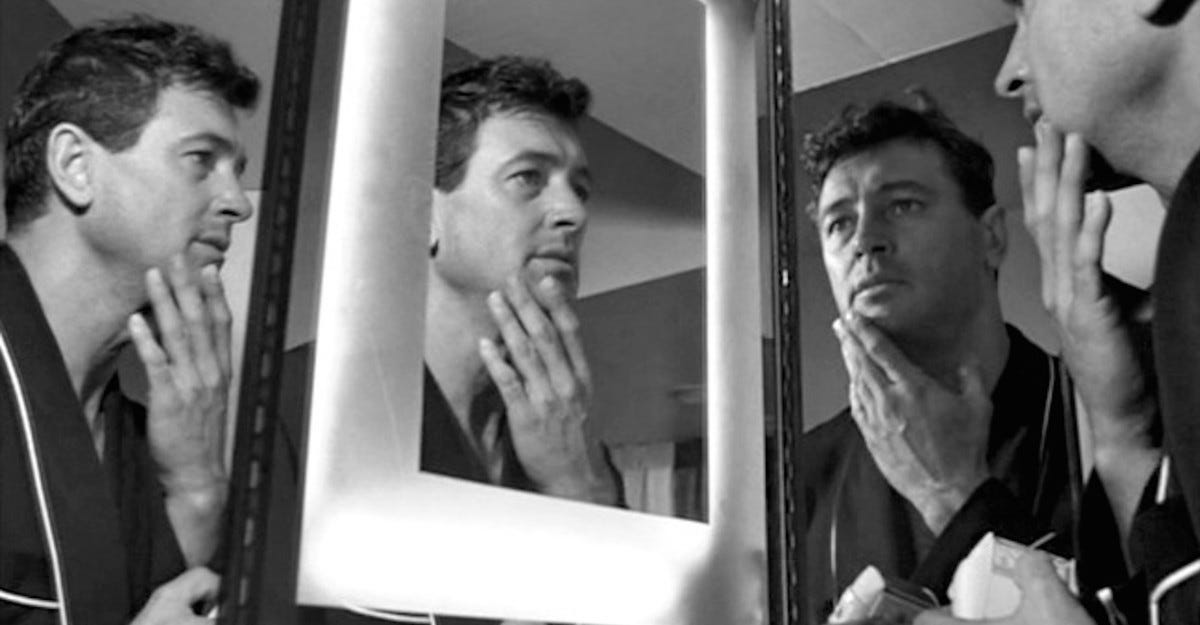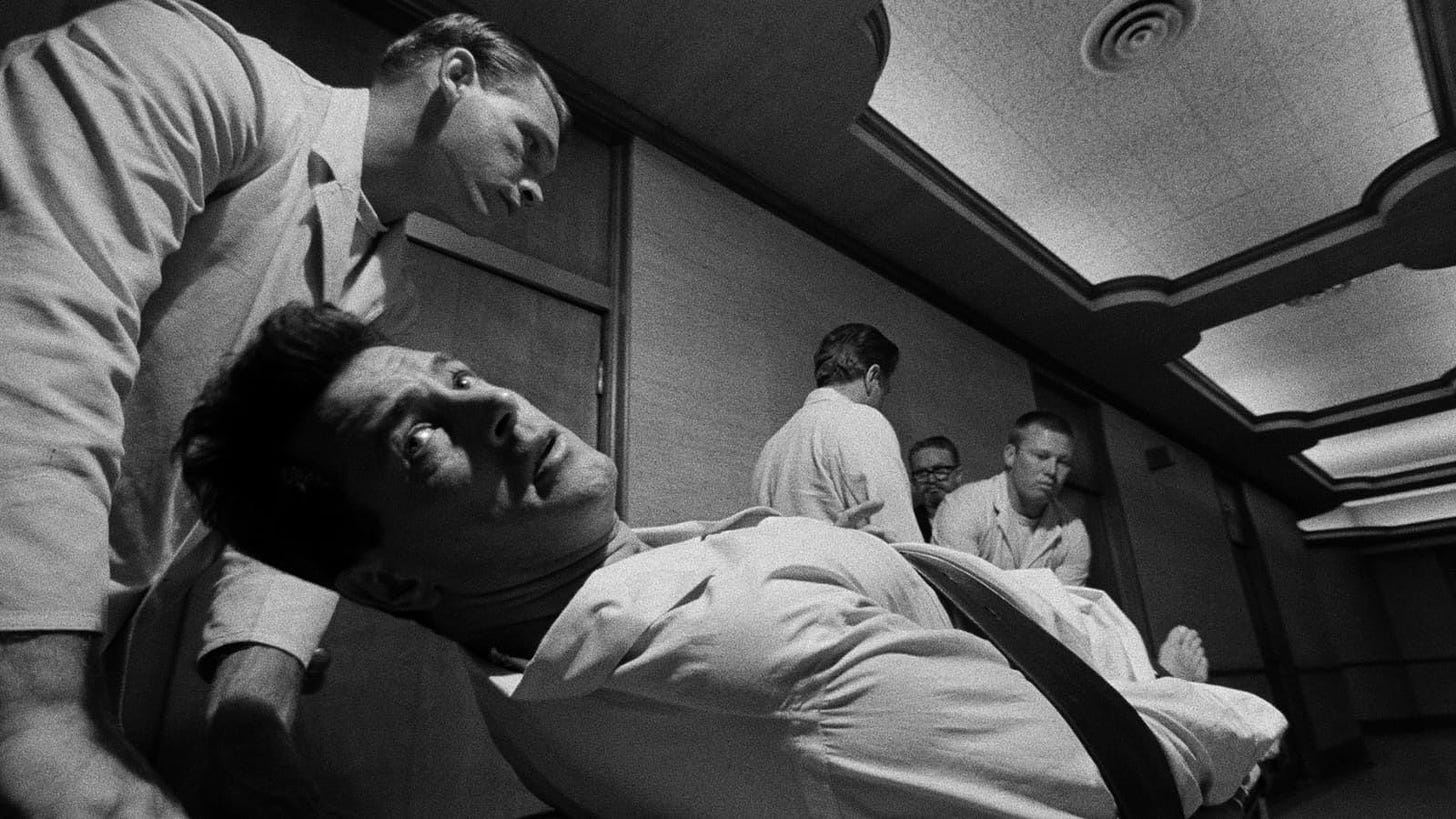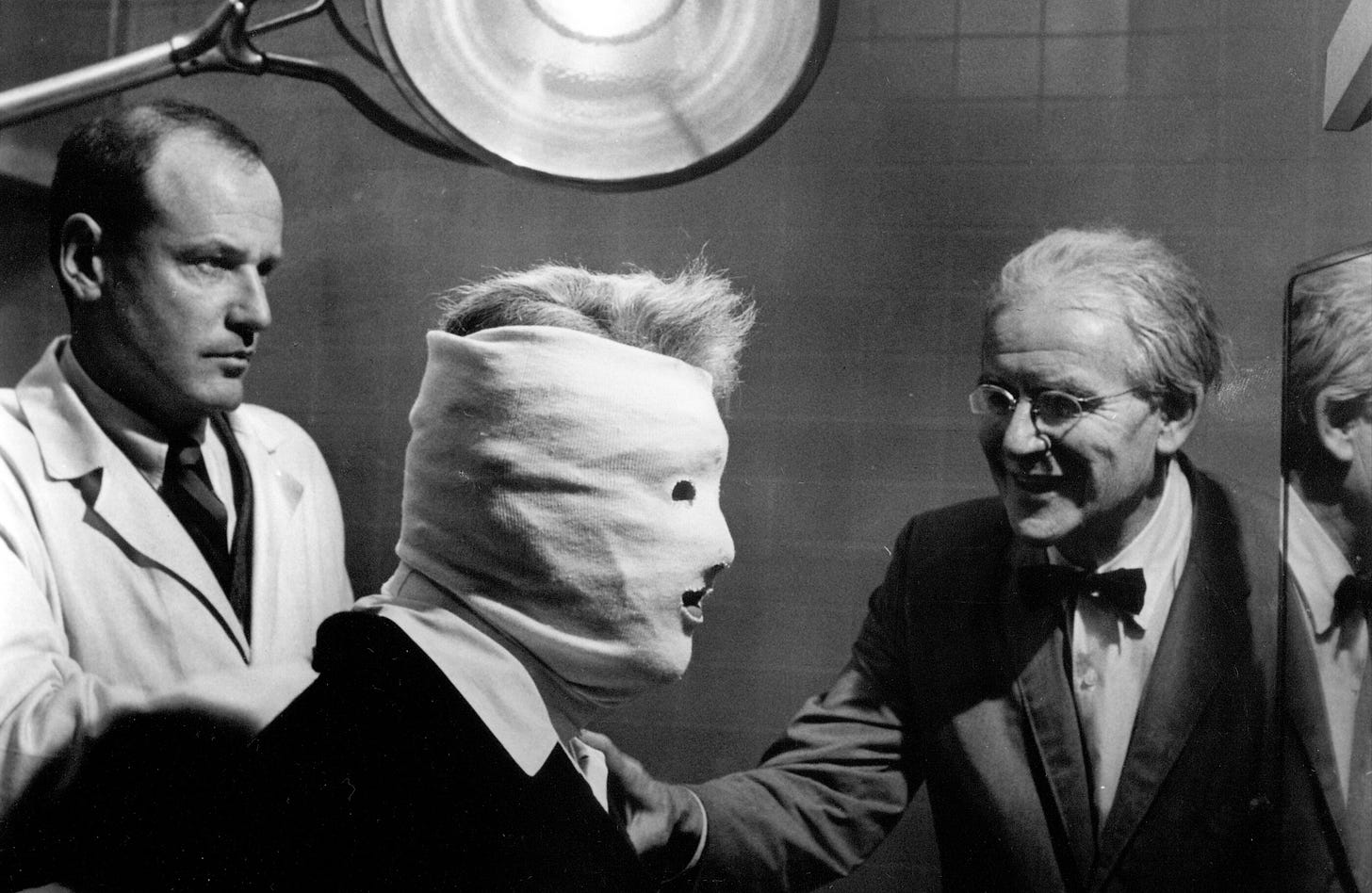The Movie of the Moment: John Frankenheimer's 'Seconds'
With 'The Substance' and 'A Different Man' opening this weekend, the influence of Frankenheimer's grim cult classic about a man switching to a younger identity looms large.
In the new movie The Substance, Demi Moore plays Elisabeth Sparkles, a TV fitness instructor so popular and successful that she’s been given a star on the Hollywood Walk of Fame to go along with a life of wealth and privilege that most would consider enviable. Yet middle age has chipped away at her body and diminished her fame, and despite a run-in with an old high-school classmate who’s still awed by how beautiful she remains, Elisabeth jumps at an unusual opportunity to take an exit ramp from the life she’s worked so hard to build. She’s given the address to a seedy, unvisited corner of Los Angeles—the metal, automated entrance only goes up about a third of the way off the ground, so she has to crawl under it—and picks up a kit that will provide (and sustain) a second, younger, more vivacious identity for herself. But for complicated reasons, she can’t leave the old her behind like a molting snake. Her existential crisis has only deepened.
Along with A Different Man, another genre hybrid about a person cursed by the decision to abandon their previous life, The Substance is one of two films released this week to evoke John Frankenheimer’s sci-fi masterpiece Seconds, which would have seemed implausible in 1966, when the film premiered to boos at Cannes and tanked at the box office. When I interviewed Frankenheimer in 2000 about the film’s growing cult reputation and the prevalence of new movies, like Being John Malkovich, about the desire to be in someone else’s skin, he joked, “Seconds is one I can laughingly refer to as the only movie I’ve made that’s gone from failure to classic without ever being a success.” Though the film did get a write-up in Danny Peary’s Cult Movies 3 in 1988—the essay referred to it as “quite possibly the most depressing film ever made”—it wasn’t available on home video until 1997, went out of print on DVD in the early ‘00s, and only in 2013 had its legacy secured by its addition to the Criterion Collection.
In Seconds, just like The Substance, there’s an underground procedure by a secret organization—referred to ominously as The Company in Frankenheimer’s film—that starts by pressing an address in the palm of our protagonist’s hand and asking them to take a leap of faith. Yet one of the elements that’s so compelling about Seconds and these films inspired by it is that we’re forced to ask ourselves why a “successful” person has opted to throw their lives away in order to start again. What happens to them afterwards may be disturbing, but it’s not much more troubling than the suggestion that they found so little satisfaction in realizing their dreams that they want to erase their old selves. Then, once they have shiny new identities—that, it should be said, would be sustainable if they did their part—they inevitably grow disenchanted. To quote Tokyo Story: “Isn’t life disappointing?”
If there’s a word to describe Arthur Hamilton, the middle-aged banker at the center of Seconds, it’s “nondescript.” Fittingly, the actor playing him, John Randolph, had a 50-year career in the business without ever quite graduating to “That Guy” status, because he looks so much more like simply “a guy.” Opening with a distorted overhead shot of Grand Central station, where the daily hubbub has a way of reducing everyone to worker ants, Seconds follows Arthur as he makes his trip back to Scarsdale by commuter train. The only difference on this day is that a stranger has given him a scrap of paper with the address 34 Lafayette Street and he tucks it securely into his suit pocket for later. Arthur sweats so profusely on the ride home that it’s as if that paper is a hunk of molten rock.
So what does Arthur’s regrettable life look like? He has a beautiful two-story home with a yard. He has a wife, Emily (France Reid), who clearly cares about him, despite his emotional remoteness. The two have raised an adult daughter who’s married off to a successful man in California, and Arthur can look forward to one last big promotion to run a large bank branch in New York. And yet, when he gets a call from his old buddy Charlie, who had supposedly died years earlier, he’s intrigued by a radical pitch to change identities: “I’m more alive than I’ve been in the last 25 years,” says Charlie, a statement that will reveal itself later as a lie. And so Arthur takes a cab to Lafayette Street and is eventually escorted through a meat-packing plant, which then transports him to the secret location where he will undergo the procedure. For $30,000, the old Arthur can die in a hotel fire while the new Arthur, reborn as the younger, hipper Tony Wilson (Rock Hudson), can live as a painter on a beach house in Malibu, California.
At that moment in the 1960s, when he was at peak form, Frankenheimer was coming off 1962’s The Manchurian Candidate and 1964’s Seven Days in May, two political thrillers that tapped into the paranoia and unrest of the Cold War era, which wasn’t dissimilar from the paranoia and unrest of the Watergate thrillers that would pop up a decade later. Seconds belongs to that tradition—the murky network behind the procedure has much in common with the brainwashing conspirators of The Manchurian Candidate—but Frankenheimer, working from David Ely’s novel (adapted by Lewis John Carlino), is more plugged into societal malaise here than politics. A nice house and a family in a suburb like Scarsdale represents something close to the American dream in the Eisenhower ‘50s, but Arthur Hamilton clearly doesn’t feel comfortable with such conventionality. It’s telling that his dabbling in watercolors leads him to the Bohemian lifestyle of “Tony Wilson” and into a new body that could thrive in this more liberated environment. The transition from Arthur Hamilton to Tony Wilson is the same transition American culture was taking as it was approaching the late ‘60s.
Hudson was not the first choice to play Wilson—Kirk Douglas and Laurence Olivier were cast ahead of him, neither of whom make much sense in the role—but he perfectly expresses the dissonance between Hamilton’s dashing, modern new appearance and the stiffness and retrograde attitudes that still shackle his interior. Hamilton may have fantasized about being an artist at the forefront of the sexual revolution, but Wilson’s discomfort in his skin is chillingly apparent, particularly in a sequence where naked revelers, including his new girlfriend Nora (Salome Jens), stomp grapes in a Dionysian party. The hedonism he perhaps once desired in his buttoned-down life as a banker from the ‘burbs is, in reality, terrifying and unhinged, and his possessiveness over Nora is an instinct that’s old-fashioned and decidedly unhip. Though Wilson eventually gives into the madness, Frankenheimer films the sequence like a waking nightmare from which he never quite recovers.
Seconds seeds more discontent into Wilson’s life through a series of twists that close on him like fingers around his throat. When he first moves to the house in Malibu, a gorgeous beachside ranch with a trendy pool and an ocean view, Wilson has John (Wesley Addy), a Company representative, to help him get acclimated to his surroundings. But he comes to realize that everyone around him is either a Company plant, like Nora, or other “reborns” who may themselves be adjusting to their new identities—or, perhaps, trying another one on for size. Wilson drowns his sorrows with alcohol, getting so drunk one night that he violates a cardinal rule by speaking openly about his previous life as Hamilton, which puts him in a mortal danger that he can’t anticipate. He cannot escape being Arthur Hamilton, and even the body of Rock Hudson feels like a prison. (Hudson’s own life in the closet gives the film additional resonance.)
There are many shocking scenes in Seconds related to The Company’s insidious inner-workings—Saul Bass’s title sequence alone is a standalone masterpiece, and the radical distortion in James Wong Howe’s cinematography suggests the dark ends of fungible identity—but Hamilton’s reunion with his wife Emily, who he revisits as Wilson, packs the hardest punch. Wilson stays in character through the entire scene. He’s not there to reveal himself to Emily as Hamilton in a different guise, but to learn about who he really is. Emily remembers her husband as hard-working but detached, a good man who nonetheless lived his life as if he were a stranger to it. “Arthur had been dead a long, long time before they found him in that hotel room,” she tells Wilson.
That line succinctly defines the dilemma at the heart of Seconds and the many films it’s influenced, including The Substance. The desire for transformation—to look better and younger, to change your environment and your lifestyle, to start over—is restricted by our own existential prison, an inability to transcend who we are fundamentally. By the end of Seconds, when Wilson/Hamilton is back inside The Company’s inner sanctum, waiting in a roomful of other “reborns” for another body and another chance, he does not realize the consequences of him failing to recruit another person for the program, as his old friend Charlie did for him. But he’s doomed no matter what. Arthur Hamilton was dead when he was alive. Killing him is a mere formality.







SECONDS is one of my favorite films and — along with THE MANCHURIAN CANDIDATE — the one by Frankenheimer I’ve revisited the most. I highly recommend listening to Frankenheimer’s commentary, which Criterion was good enough to port over from an earlier DVD release. His commentaries are always good, but his insights into SECONDS (including the foibles of shooting a major motion picture in your own house — Frankenheimer’s standing in for Tony Wilson’s) are essential.
Now me very intrigued to check out Seconds. And this review also brought to mind that show where Paul Rudd has to live with new-and-improved clone of self, which me had completely forgotten about until just now.